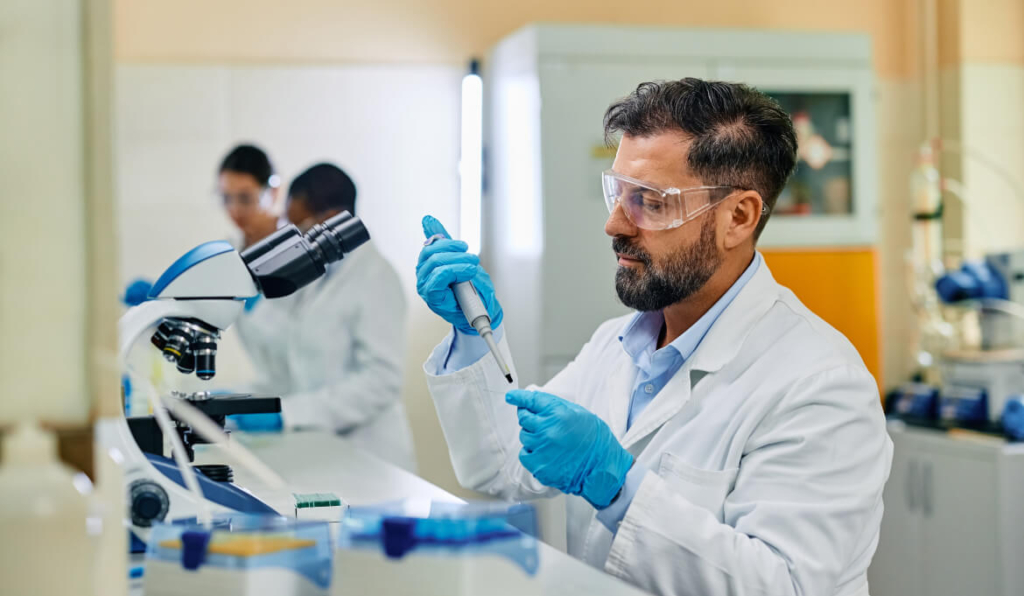Breast Cancer Screening Guidelines & Diagnosis
Whether you are just beginning regular cancer screenings, or are at a stage where you need a diagnosis, our Jim and Eleanor Randall Breast Center is the best imaging partner for you. We also welcome the opportunity to provide you the second opinion you deserve.
Call (626) 995-9001 to learn more about the Huntington Cancer Center and receive a physician referral.
Jim and Eleanor Randall Breast Center for Imaging
The Jim and Eleanor Randall Breast Center is operated by Huntington Health Physicians, our trusted outpatient physician partner group, and staffed by expert radiologists from The Hill Medical Corporation. Our patients receive rapid access to diagnostics and screening with state-of-the-art technology and expert care for the highest quality breast imaging services.
Learn more about breast imaging at the Jim and Eleanor Randall Breast Center or contact them at (626) 793-6141 to schedule an appointment or get more information.

Breast Cancer Diagnosis
Receiving a cancer diagnosis is always challenging, and you may experience feelings of shock, anger, disbelief, grief and uncertainty.
Rest assured that state-of-the-art diagnostic technologies, delivered by our partners at the James and Eleanor Randall Breast Center mean more cancers are found at their earliest, treatable stages when more treatment options are available and survival chances are improved.
Breast Cancer Screening
Screenings save lives. Huntington Cancer Center has developed cancer screening guidelines, bringing together the most up-to-date recommendations from leading cancer authorities. Starting at age 40, women should get an annual screening mammogram.
Explore Breast Cancer screening guidelines as well as recommendations for other common cancer screenings that may help you or a family member be proactive in managing your health.
You should also be familiar with breast cancer signs and symptoms so you can be a proactive part of maintaining your health.
Start Screenings Today
Visit the James and Eleanor Randall Breast Center to learn about state-of-the-art screening technologies, including traditional screening and diagnostic mammography, breast ultrasound and biopsy, and now, digital breast tomosynthesis (TOMO). Also known as 3D mammography, TOMO is an effective screening option for women with dense or extremely dense breasts, or who have been determined to have a higher lifetime risk of breast cancer.

Genetic Counseling
Over the past several years, inherited factors, or genes, have been identified that can contribute to the development of some forms of breast, ovarian, colorectal and other types of cancer.
The Huntington Hospital Cancer Center offers hereditary cancer risk assessment and genetic counseling to people who are concerned about their personal and/or family history of cancer and risk to other family members.
The Role of Genetic Testing in Cancer
There are currently two breast cancer genes recognized:
- BRCA 1
- BRCA 2
These genes are involved in DNA repair, and when certain mutations in these genes are present, the ability of a breast cell to repair its DNA is hampered, and the cell becomes prone to becoming cancerous. To date, nearly a thousand mutations in the BRCA 1 and BRCA 2 genes have been identified, and many of these have been found to be associated with a significantly increased risk of breast cancer and ovarian cancer.
Important Breast Cancer Facts
- In the United States, one in eight women will be diagnosed with breast cancer in their lifetime.
- The majority of breast cancers are not hereditary. Therefore, the absence of a family history of breast cancer does not preclude a woman from being diagnosed with breast cancer herself. Conversely, the presence of a family history of breast cancer does not necessarily mean that your cancer is hereditary. In order to determine whether or not there is a significant family history that may be suggestive of a hereditary predisposition, your doctor will ask a for a detailed cancer history of your family tree.
Certain patterns of cancer in a family may indicate the presence of a BRCA gene mutation. BRCA gene testing is a DNA test which can be performed on either a blood sample or saliva sample. Most insurance plans will cover all/part of the test expense if you meet the appropriate criteria. If you meet any of these criteria, your doctor will discuss genetic testing with you, or refer you to a genetic counselor, medical geneticist, oncologist, or other health professional with expertise and experience in cancer genetics.
Should I Do Genetic Testing?
Identification of a deleterious BRCA mutation may have significant implications on your future risk of a new breast cancer or ovarian cancer, and may be helpful in helping you and your doctors determine the best treatment option and follow-up/surveillance plan for you.
The NCCN (National Comprehensive Cancer Network) has published a set of guidelines to help doctors determine when genetic testing may be appropriate in a breast cancer patient.
These include:
- Early age onset breast cancer ≤ 50 years old
- Triple negative [ER(-) PR (-) HER2/neu (-)] breast cancer ≤ 60 years old
- Two breast cancer primaries in a single individual (at the same time, or at different times)
- Breast cancer at any age with: ≥ 1 close blood relative (1st, 2nd, 3rd degree) with breast cancer ≤ 50 years old, or ≥ 1 close blood relative (1st, 2nd, 3rd degree) with ovarian/fallopian tube cancer at any age, or ≥ 2 close blood relatives with breast cancer and/or pancreatic cancer at any age
- Ovarian/fallopian tube cancer
- Male breast cancer
- Ashkenazi Jewish descent
For Trusted Care
Get the Cancer Care You Need
Call us to learn more about our trusted cancer services and to receive a physician referral.
 English
English Espanol
Espanol 简体中文
简体中文 Tagalog
Tagalog հայերեն
հայերեն 한국인
한국인 Tiếng Việt
Tiếng Việt فارسی
فارسی русский
русский 日本
日本 عربي
عربي